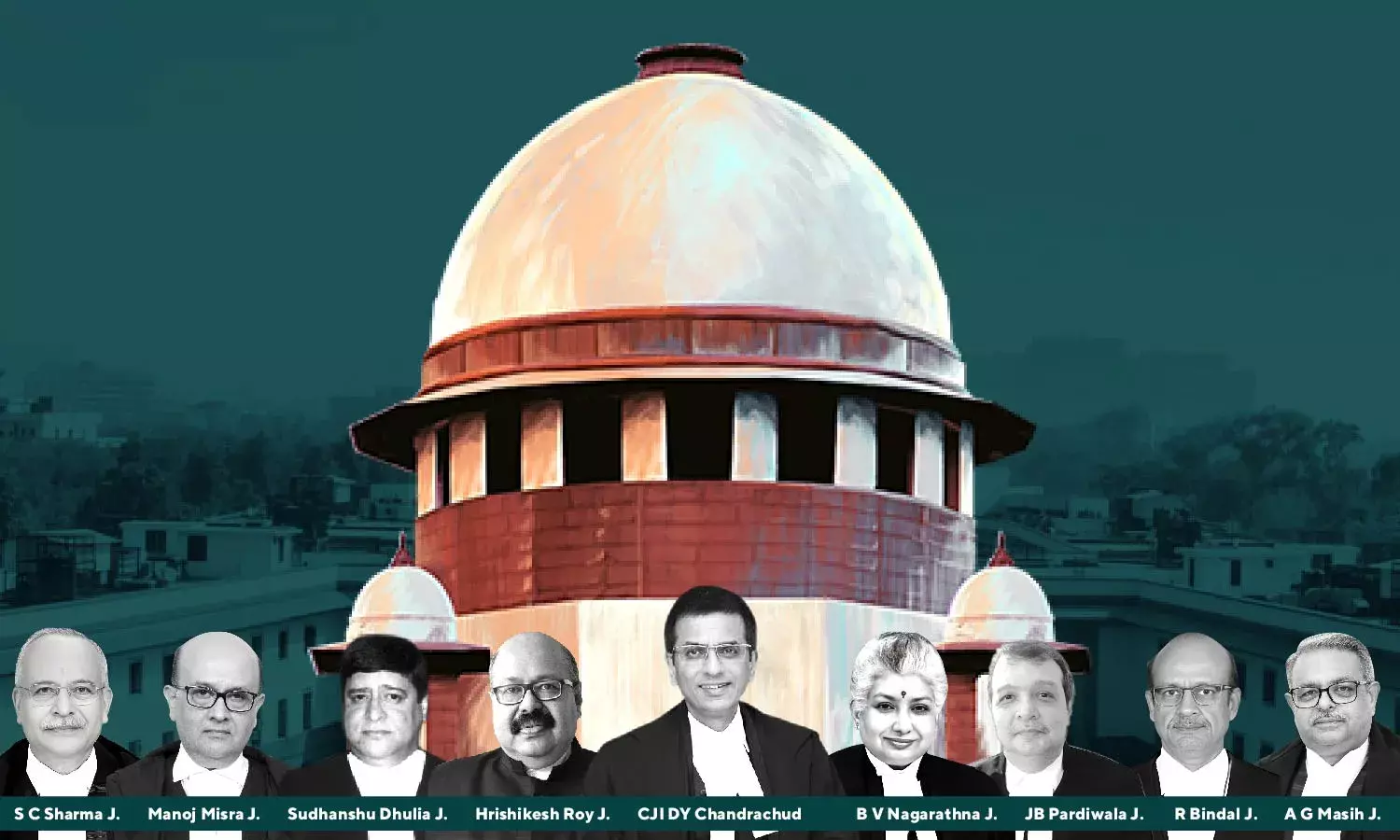Our Directive Principles Have Foundation In Gandhian Ethos, We Have Not Adopted Socialistic Model Where There Is No Private Property At All: Chief Justice Chandrachud

During the hearing before the 9-Judge Bench which is considering the scope of private property under Article 39(b), Chief Justice DY Chandrachud remarked, "Our directive principles, we must understand, have their foundation in the Gandhian ethos. The directive principles are really in persuance of the Gandhian ideology, and what is that ethos? Our ethos regards property as something which is held in trust; we don't go as far as to adopt the socialistic model, that there is no private property at all, of course we have private property. And that concept of trust, which is now being applied in the context of say, sustainable development, in the environmental context".
The Bench, comprising Justice Hrishikesh Roy, Justice BV Nagarathna, Justice Sudhanshu Dhulia, Justice JB Pardiwala, Justice Manoj Misra, Justice Rajesh Bindal, Justice Satish Chandra Sharma, and Justice AG Masih, highlighted the need for a clear distinction between community resources held in trust for future generations and privately owned property like a flat .
The case pertains to a challenge against Chapter VIIIA of the Maharashtra Housing and Area Development Act, 1976 (MHADA), which authorizes the Mumbai Building Repair and Reconstruction Board (MBRRB) to acquire certain properties for restoration with the consent of 70 percent of residents.
During the hearing on Wednsday, the CJI, while commenting on the philosophical approach of Justice V R Krishna Iyer and Justice Chinnappa Reddy, said, "If you look at the purely capitalist concept of property, the capitalist concept of property attributes a sense of exclusiveness to property. This is my pen; it's exclusively mine; nobody else can use my pen. The Socialist concept concept of property is the mirror image, which attributes to property a notion of commonality, nothing is exclusive to the individual, all property is common to the to the community, that's the extreme socialist view."
He further said, "Our concept of property has undergone a very different, a very subtle change from either the extreme capitalist perspective or the extreme socialist perspective. We regard property as something which we hold in trust. We hold the property in trust for the succeeding generations in the family. But, broadly, we also hold that property in trust for the wider community. That's the whole concept of sustainable development: that property, which we have today, as today's generation, we hold in trust for the future of our society; that's what we call an inter-generational equity."
The CJI also said, "It may be a little extreme to suggest that 'material resources of the community' only means resources which do not have their origin in the private property of an individual. I'll tell you why it will be dangerous to take that view. Take simple things like mines, forests, even private forests. For us to, for instance, say that the moment a forest is a private forest Article 39(b) will not apply, and therefore it's hands off, would be extremely dangerous a proposition."
"We must put ourselves back in the 1950s when the Constitution was made, the Constitution which was intended to bring about a sense of social transformation and that was the social transformative ideal of .... Whether this act is valid is a completely different issue, but we can't say that Article. 39(b) has no application when once property is privately held property, because the societal demands, the societal welfare, the the need for redistribution, considering the societal perspective. So it may be airwaves, it may be water, it may be forests, it may be mines, in some areas it probably the dividing line becomes very clear, just taking somebody's flat," Chief Justice Chandrachud remarked during the hearing on Wednsday.
The CJI had emphasized that the Constitution of India was intended to bring about a social transformation; therefore, he said, "We shouldn't therefore go as far as to say that the moment property is private property, Article 39 (b) and (c) will have no application."
Pertinently, during the hearing Tuesday, Advocate Sameer Parekh, on behalf of the Petitioner, contended that Justice Iyer's view was too extreme. He submitted, "What, in fact, Justice Krishna Iyer does advocate is that, please, acquire private property and distribute it. That is too extreme a view. It's too extreme; it's a Marxist concept that you acquire everybody's land and give it to everybody else. That is not in our humble submission, the intent of Article 39(b). It cannot be interpreted in that manner. The duty being cast on the State is not that go and acquire everybody's private property and give it to everybody else. That's not in our humble submission, what 39(b) is seeking to achieve."
Parekh had argued that a State can acquire any land for public purposes and use it for various purposes, but Article 39(b) does not say that you shall go and acquire all private properties and redistribute them. "That's not our Constitution. That may be a Marxist Constitution. Our Constitution is, you can acquire it," he had contended.
Cause Title: Property Owners Association v. State of Maharashtra [Civil Appeal No. 1012/2002]

